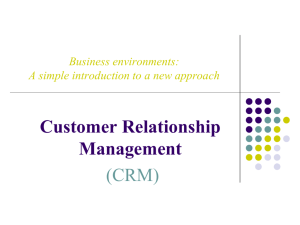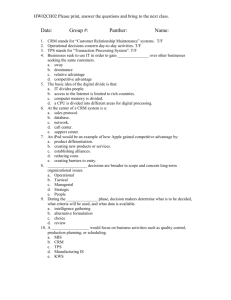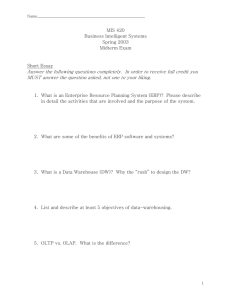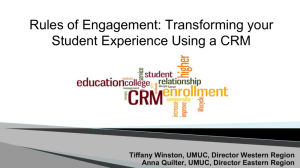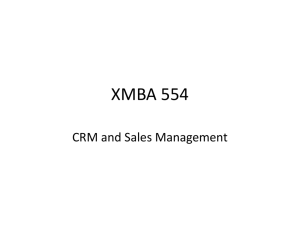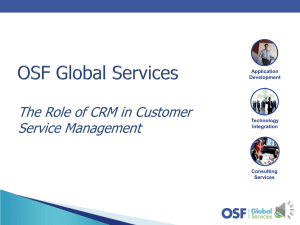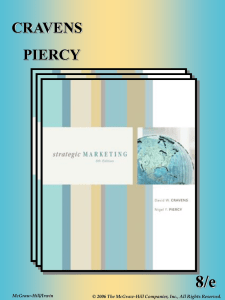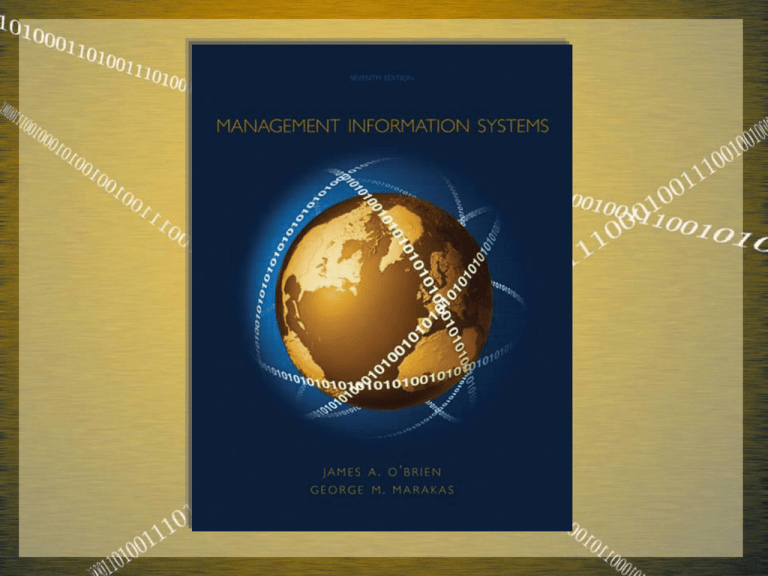
Copyright © 2006, The McGraw-Hill Companies, Inc. All rights reserved.
8-1
Chapter
8
Enterprise Business Systems
Copyright © 2006, The McGraw-Hill Companies, Inc. All rights reserved.
8-2
Why Study Customer
Relationship Management?
• It is easier than ever for customers to
comparison shop and, with a click of the
mouse, to switch companies. As a result,
customer relationships have become a
company’s most valued asset.
Copyright © 2006, The McGraw-Hill Companies, Inc. All rights reserved.
8-3
Customer Relationship Management (CRM)
Definition:
• The use of information technology to
create a cross-functional enterprise
system that integrates and automates
many of the customer-serving processes
in sales, marketing, and customer
services that interact with a company’s
customers
Copyright © 2006, The McGraw-Hill Companies, Inc. All rights reserved.
8-4
CRM Application Clusters
Copyright © 2006, The McGraw-Hill Companies, Inc. All rights reserved.
8-5
CRM Application Components
• Contact and Account Management – helps
sales, marketing, and service professionals
capture and track relevant data about every
past and planned contact with prospects and
customers, as well as other business and life
cycle events of customers
• Sales – provides sales reps with tools and
company data sources needed to support and
manage sales activities, and optimize crossselling and up-selling
Copyright © 2006, The McGraw-Hill Companies, Inc. All rights reserved.
8-6
CRM Application Components
• Marketing Fulfillment – help marketing
professionals accomplish direct marketing
campaigns by automating such tasks as
qualifying leads for targeted marketing, and
scheduling and tracking direct marketing
mailings
• Customer Service and Support – provides
service reps with software tools and real-time
access to the common customer database
shared by sales and marketing professionals
Copyright © 2006, The McGraw-Hill Companies, Inc. All rights reserved.
8-7
CRM Application Components
• Retention and Loyalty Programs – help a
company identify, reward, and market to
their most loyal and profitable customers
Copyright © 2006, The McGraw-Hill Companies, Inc. All rights reserved.
8-8
Three Phases of CRM
Copyright © 2006, The McGraw-Hill Companies, Inc. All rights reserved.
8-9
Three Phases of CRM
• Acquire new customers by doing a superior job
of contact management, sales prospecting,
selling, direct marketing, and fulfillment
• Enhance relationship with customer by
supporting superior service from a responsive
networked team of sales and service specialists
and business partners
• Retain and expand business with customers by
proactively identifying and rewarding the most
loyal and profitable customers
Copyright © 2006, The McGraw-Hill Companies, Inc. All rights reserved.
8 - 10
Benefits of CRM
• CRM allows a business to identify and
target their best customers so they can be
retained as lifelong customers for greater
and more profitable services.
• CRM makes possible real-time
customization and personalization of
products and services based on customer
wants, needs, buying habits, and life
cycles.
Copyright © 2006, The McGraw-Hill Companies, Inc. All rights reserved.
8 - 11
Benefits of CRM
• CRM can keep track of when a customer
contacts the company, regardless of the
contact point.
• CRM systems can enable a company to
provide a consistent customer experience
and superior service and support across
all the contact points a customer chooses.
Copyright © 2006, The McGraw-Hill Companies, Inc. All rights reserved.
8 - 12
CRM Failures
• Lack of understanding and preparation
• Rely on CRM to solve business problem
without first developing the business
process changes and change
management programs that are required
• CRM projects implemented without the
participation of the business stakeholders
involved
Copyright © 2006, The McGraw-Hill Companies, Inc. All rights reserved.
8 - 13
Trends in CRM
• Operational
• Analytical
• Collaborative
Copyright © 2006, The McGraw-Hill Companies, Inc. All rights reserved.
8 - 14
Operational CRM
• Supports customer interaction with greater
convenience through a variety of
channels.
• Synchronizes customer interactions
consistently across all channels
• Makes your company easier to do
business with
Copyright © 2006, The McGraw-Hill Companies, Inc. All rights reserved.
8 - 15
Analytical CRM
• Extracts in-depth customer history, preferences,
and profitability information from your data
warehouse and other databases
• Allows you to analyze, predict, and derive
customer value and behavior and forecast
demand
• Lets you approach your customers with relevant
information and offers that are tailored to their
needs
Copyright © 2006, The McGraw-Hill Companies, Inc. All rights reserved.
8 - 16
Collaborative CRM
• Enables easy collaboration with
customers, suppliers, and partners
• Improves efficiency and integration
throughout the supply chain
• Allows greater responsiveness to
customer needs through sourcing of
products and services outside of your
enterprise
Copyright © 2006, The McGraw-Hill Companies, Inc. All rights reserved.
8 - 17
CRM Videos to Watch
• http://www.youtube.com/watch?v=BMtv6sbmdLc
• http://www.youtube.com/watch?v=6dGPIzydIIg
• http://www.youtube.com/watch?v=7nfzN4zQeTI
• http://www.youtube.com/watch?v=_r1H7OK8lzY
Copyright © 2006, The McGraw-Hill Companies, Inc. All rights reserved.
8 - 18

